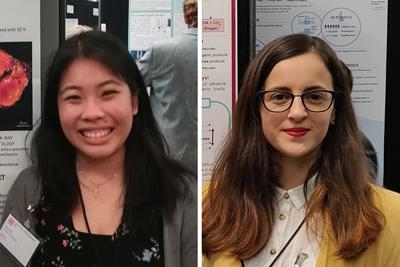Early career engineers present bioengineering and bioenergy advances at parliament

Postgraduate research students from the University of Southampton presented cutting-edge advances in 3D X-rays for biological tissues and chemical production from organic wastes at the STEM for Britain exhibition.
Elaine Ho and Maria Ramos Suarez explained their work to Members of the Houses of Parliament in the poster competition at Westminster’s Portcullis House.
The pair were two of eight promising Southampton researchers to exhibit at the national showcase. Electronic engineer Ben Fletcher was awarded the event’s IEEE Communications Society Prize for his innovative stacking of silicon chips.
Elaine’s PhD research is extending the microscopy of biological specimens into 3D using X-rays. The 3D X-ray histology approach, which is being advanced at Southampton’s µ-VIS X-ray Imaging Centre, visualises samples without causing any damage to the subject. The technique will help make image-based disease diagnosis and treatment planning more efficient and accurate.
“When a patient has a tumour removed from the body, clinicians will look at a very thin section of this tissue under the microscope to decide on a diagnosis and treatment plan,” she explains. “However, this approach is a lot like reading a single page in a book in great detail and expecting to understand the entire story. Looking at a thin section gives us lots of information about the specimen, but not in the context of the entire 3D system.
“It was an honour to present my research to parliamentarians and policymakers. I think it’s really important that researchers, especially early career researchers, have some form of experience interacting with policymakers and can demonstrate the impact of investing in research and the careers of aspiring research scientists and engineers.”
Maria’s research focuses on generating useful chemicals from biodegradable waste. The collaborative project with Fiberight Ltd is optimising the microbial production of volatile fatty acids during acidogenic fermentation.
“Volatile fatty acids are used in a wide range of applications, including biofuels, bioplastics, synthetic materials and nutrient recovery, but are currently sourced from fossil fuels,” she says. “This technology not only presents an alternative to petroleum chemicals but it can also reduce the amount of waste sent to landfill, a waste management practice that has devastating consequences for the environment.
“The most encouraging part of STEM for Britain was speaking to MPs who have power over research budgets and can influence policies related to waste management. The event gave me a voice and I felt heard.”
Maria, Elaine and Ben Fletcher were three of around 50 UK early career researchers to exhibit in the Engineering category of STEM for Britain 2020. Southampton’s Cristina Argudin Violante represented the School of Biological Sciences, Sam Perry appeared for Chemistry, Fatumah Atuhaire and Isobel Webster presented in Mathematics and Krzysztof Herdzik featured in Physics.